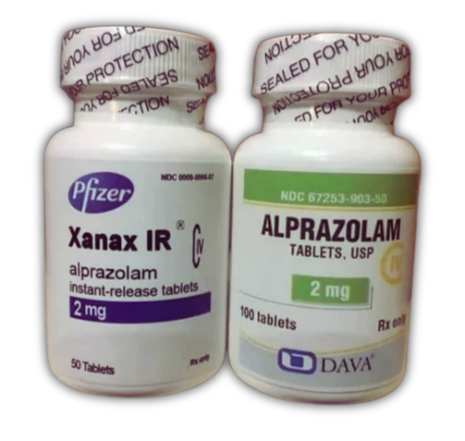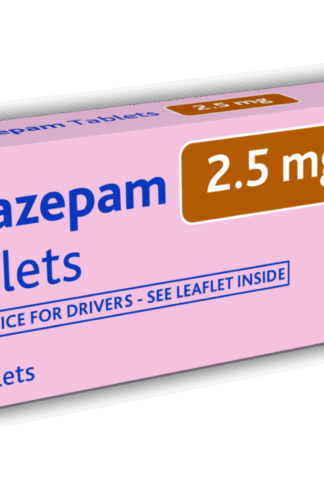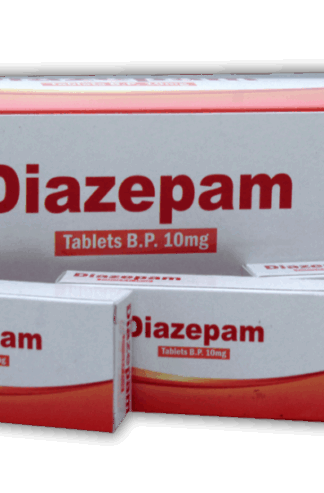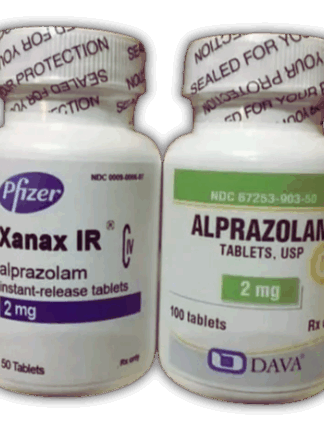Description
Xanax, or alprazolam, is one of the most commonly prescribed medications for anxiety and panic disorders in the UK. This fast-acting benzodiazepine works by boosting certain brain chemicals to create a calming effect.
Its potency and the risk of dependence mean patients really need to weigh both the benefits and the risks. Xanax is a controlled substance that can treat anxiety disorders and panic attacks when used properly under medical supervision, but it comes with big risks—addiction, severe withdrawal, and dangerous interactions with other substances.
Many people look up how to buy this medication online, but understanding the legal and safety issues is crucial before making any decisions. If you’re considering Xanax for the first time or just want to understand your current prescription better, this guide will walk you through approved uses, dosing, side effects, pricing, and how to stay safe with such a powerful medication.
What Is Xanax (Alprazolam)?
Xanax is the brand name for alprazolam, a prescription drug in the benzodiazepine family. It affects brain chemicals to ease anxiety and panic.
Chemical Classification and Mechanism of Action
Alprazolam is a benzodiazepine from the triazolobenzodiazepine subgroup. That’s just a fancy way of describing its chemical structure and its effects on the brain.
The drug ramps up the activity of GABA (gamma-aminobutyric acid), which is a neurotransmitter that helps calm nerve activity. When you take alprazolam, it binds to GABA-A receptors and makes GABA’s calming effect stronger.
This helps reduce anxiety, panic, and even muscle tension. It’s fast-acting—usually kicking in within 30 to 60 minutes.
Immediate-release tablets last about 6 hours, while extended-release forms can work up to 11 hours. Your liver processes alprazolam through an enzyme called cytochrome P450 3A4, and your kidneys help get it out of your system.
Difference Between Xanax, Alprazolam, and Alpraz
Xanax is the original brand name, made by Pfizer. It’s probably the most well-known version worldwide.
Alprazolam is the generic name. Generics have the same active ingredient as Xanax, but the fillers or colours might differ.
Alpraz is just a casual nickname for alprazolam. It’s not an official medication name, so don’t use it when talking to your doctor.
All versions work the same way in your body. Generics have to meet the same safety and effectiveness standards as brand-name Xanax.
- Cost: Generics are usually cheaper than Xanax
- Appearance: Tablets might look different depending on the manufacturer
- Inactive ingredients: These can vary
Benzodiazepines Compared to Other Depressants
Benzodiazepines like alprazolam are central nervous system depressants, but they aren’t the same as other depressants out there. For example, alcohol is also a depressant but works through different brain pathways.
Alcohol does affect GABA, but it hits other neurotransmitters too and is rougher on your organs. Barbiturates are older depressant meds that also boost GABA activity, but they’re riskier since they can slow breathing or heart function to dangerous levels.
Opioids target different brain receptors and mainly relieve pain, not anxiety. They mess with the brain’s reward system in their own way.
Benzodiazepines are generally safer than barbiturates because there’s a bigger gap between a normal dose and a dangerous overdose. Still, they can cause dependence, tolerance, and withdrawal if you use them regularly.
Mixing benzodiazepines with other depressants—especially alcohol or opioids—makes side effects way more dangerous. Breathing problems are a real risk.
How to buy Alprazolam (Xanax) online safely?
If you want to buy Xanax online, you need to be careful and follow the rules. Only licensed healthcare providers can prescribe it through proper telehealth services.
Look for verified platforms that use registered doctors and stick to strict regulations. Check if they have accreditation from recognised healthcare organisations.
Always complete an online consultation with a licensed doctor first. Any legit service will require a real medical assessment before prescribing Xanax.
Check the provider’s credentials and make sure they’re licensed where you live. Patient reviews can help too.
| Safety Feature | What to Check |
|---|---|
| Doctor licensing | Verify credentials are current |
| Platform security | Look for HIPAA compliance |
| Prescription process | Requires proper consultation |
| Pharmacy partnerships | Uses registered pharmacies |
Don’t trust websites that offer Xanax without a prescription. Those sites often sell counterfeit or outright dangerous products.
Review privacy policies to make sure your info stays safe. Real platforms use encryption for all patient data.
Expect to have follow-up appointments after you get your prescription. Good doctors monitor how you’re doing with the medication.
Use registered pharmacies to fill your prescription. Your doctor should tell you which pharmacies will accept it.
The whole process takes some time because proper care shouldn’t be rushed. Patient safety has to come first, even if it’s less convenient.
What is the fair Alprazolam price?
The price of alprazolam depends a lot on whether you get it legally or not. Legal prescription costs in the UK range from about £0.35 to £5 per tablet, depending on where you are and the dosage strength.
Private prescriptions usually cost more than NHS ones. For example, a 0.5mg tablet might cost around £5 in London, but it can be much cheaper elsewhere.
In the US, legally prescribed Xanax costs about $5.56 per 0.25mg pill if you don’t have insurance. Discount cards can bring that price down by up to 80%.
Street prices are higher and riskier:
| Location | Price Range |
|---|---|
| UK | £0.35 – £5 per pill |
| US Cities | $2 – $10 per pill |
| Australia | $1 – $20 AUD per pill |
- Dosage strength (0.25mg, 0.5mg, 1mg, 2mg)
- Location and demand
- Supply
- Insurance coverage for legal prescriptions
Street alprazolam isn’t just expensive—it’s dangerous. Illegal pills sometimes contain fentanyl or other risky additives.
The safest and most affordable way is to get alprazolam through a legitimate medical provider. Generics are usually cheaper than branded Xanax but work just as well.
If you’re worried about cost, talk to your GP or pharmacist. They might know about discount programs or cheaper generic options.
Approved Uses and Indications
The FDA approved alprazolam in 1981 for certain mental health conditions. Doctors mainly prescribe Xanax for anxiety disorders and panic disorder, following strict short-term use guidelines.
Anxiety Disorders
Alprazolam treats generalised anxiety disorder and related conditions. People with these issues feel excessive worry, restlessness, and have physical symptoms that get in the way of daily life.
The medication boosts GABA in the brain, calming things down within 30 to 60 minutes. Doctors usually turn to Xanax when other treatments—like therapy or non-addictive meds—haven’t worked.
- Persistent worry and fear
- Physical tension and restlessness
- Sleep problems
- Difficulty concentrating
- Muscle tension
Doctors look at each patient’s symptoms and the risk of dependency before prescribing.
Panic Disorder
Xanax is also used for panic disorder, where people have sudden, intense episodes of fear. These panic attacks can show up out of nowhere and feel overwhelming.
Symptoms include a racing heart, sweating, shaking, and feeling like something terrible is about to happen. Some people say it feels like they might die or completely lose control.
Alprazolam acts quickly to ease panic attacks. When taken as prescribed, it can reduce both how often attacks happen and how severe they feel.
- Chest pain and palpitations
- Shortness of breath
- Dizziness or lightheadedness
- Hot or cold flushes
- Fear of losing control
Doctors try to use the lowest dose that works and keep a close eye on patients to avoid problems with tolerance or dependence.
Short-Term Relief of Symptoms
Doctors prescribe Xanax for short-term relief only. Using it for longer increases the risk of tolerance, dependence, and tough withdrawal.
Most prescriptions shouldn’t last more than 8 to 12 weeks. Doctors check in regularly and may tweak the dose if needed.
The medication gives temporary relief while patients work on coping skills through therapy or lifestyle changes.
- Initial prescriptions usually cover 2-4 weeks
- Regular checkups are important
- Doses should be reduced gradually to avoid withdrawal
- Other treatments should be considered as well
It’s important to follow dosing instructions exactly. Taking more than prescribed or using Xanax recreationally is risky and can seriously harm your health.
Side Effects and Risks
Alprazolam can cause side effects, from mild drowsiness to serious breathing problems or addiction. The risks go up if you mix it with other substances or use it for a long time.
Common Side Effects
Most people notice some side effects when they start alprazolam, but these often fade as your body gets used to it.
- Drowsiness and tiredness
- Dizziness or feeling lightheaded
- Memory lapses
- Trouble focusing
- Dry mouth
- Changes in appetite
It’s pretty common to feel off-balance or unsteady. Some people get headaches or blurred vision, and nausea or constipation can show up too.
Usually, these side effects improve after a few days or weeks. If they stick around or get worse, it’s time to call your doctor.
Serious Adverse Reactions and Overdose
Alprazolam can cause life-threatening reactions, especially when combined with other medications. The danger jumps with higher doses or if you mix it with alcohol or opioids.
Warning signs of overdose include:
- Severe drowsiness or inability to wake up
- Slowed or stopped breathing
- Blue lips or fingernails
- Weak pulse
- Cold, clammy skin
If you see these symptoms, get emergency help right away. Call 999 immediately.
Alcohol, opioids, and other depressants can react dangerously with alprazolam. These combos sometimes lead to coma or death.
Rarely, allergic reactions can cause swelling of the face, throat, or tongue. If this happens, seek emergency care.
Drowsiness, Sleepiness, and Dizziness
Sedation is a common effect of alprazolam. The drug calms the nervous system, which often makes people drowsy.
Many patients feel very sleepy, especially during the first few weeks. This drowsiness might last for hours after taking a dose.
Dizziness can hit when standing up quickly. Alprazolam sometimes lowers your blood pressure, so be careful.
Safety precautions include:
- Avoid driving or operating machinery
- Get up slowly from sitting or lying down
- Use handrails on stairs
- Don’t drink alcohol at all
The sedating effects can mess with judgment and slow reaction time. People often underestimate how much it affects them.
Higher doses cause more severe drowsiness and dizziness. Dose matters a lot with these side effects.
Mental Health Considerations
Alprazolam can worsen depression in some people. It may increase feelings of sadness or hopelessness.
Suicidal thoughts sometimes develop, especially in younger people or those already struggling with depression. Family and friends should watch for changes in mood or behavior.
Some folks experience the opposite effect—more anxiety or agitation. These “paradoxical” effects pop up more often in older adults.
Memory problems can creep in and disrupt daily life. It’s not unusual to forget conversations or events that happened while on the drug.
Mental health risks include:
- Worsening depression
- Suicidal thoughts
- Confusion or disorientation
- Personality changes
Stopping alprazolam abruptly can trigger seizures. Always work with your doctor to taper off slowly.
Using alprazolam for a long time can lead to dependence and tolerance. The brain gets used to it, so you might need higher doses for the same effect.
Interactions and Contraindications
Alprazolam interacts with hundreds of medications, from minor to major. Alcohol makes things much riskier, and certain antifungals like ketoconazole and itraconazole are a hard no.
Medicines to Avoid
Some drugs just shouldn’t be taken with alprazolam. Strong CYP3A inhibitors are at the top of that list.
Ketoconazole and itraconazole block the enzymes that break down alprazolam. This causes dangerously high levels in your system.
That can lead to severe sedation, confusion, and breathing trouble. It’s not worth the risk.
Other high-risk combinations include:
- Ritonavir (HIV medication)
- Clarithromycin (antibiotic)
- Nefazodone (antidepressant)
Always tell your doctor about every medication you take before starting alprazolam. Even supplements can interact in unexpected ways.
Central Nervous System Depressants
Mixing alprazolam with other depressants increases the risk of serious side effects. Both slow down your brain and breathing.
Common depressants that interact with alprazolam:
- Opioid painkillers (tramadol, codeine)
- Sleep aids (zolpidem, temazepam)
- Antihistamines (diphenhydramine)
- Muscle relaxants
- Certain antidepressants
These combinations can cause extreme drowsiness and dangerously slow breathing. People can lose consciousness or even stop breathing in severe cases.
Sometimes doctors prescribe these together, but only with close monitoring. Never adjust your dose on your own if you’re taking multiple depressants.
Effects with Alcohol
Alcohol and alprazolam are a dangerous mix. Both depress your central nervous system and slow your breathing.
Even a little alcohol can make alprazolam’s effects much stronger. People might feel extremely drowsy, confused, or lose their coordination.
Dangerous effects include:
- Slowed or stopped breathing
- Loss of consciousness
- Memory problems
- Increased risk of accidents
This combination can be deadly, especially at higher doses. Avoid alcohol completely while on alprazolam.
Watch out for medicines that contain alcohol, like some cough syrups. Even cooking wine or extracts with alcohol should be used carefully.
Special Considerations
Some groups need extra caution with alprazolam. Pregnant or breastfeeding women and older adults face higher risks and process the drug differently.
Pregnancy and Breastfeeding
Alprazolam isn’t recommended during pregnancy because it can harm the developing baby. The drug crosses the placenta and may cause serious problems.
First trimester exposure might raise the risk of:
- Birth defects
- Cleft lip or palate
- Heart problems
Later in pregnancy, risks include:
- Withdrawal symptoms in newborns
- Breathing problems at birth
- Severe sedation in the baby, sometimes needing medical care
If you’re taking alprazolam and get pregnant, talk to your doctor right away. Usually, you’ll need to taper off slowly under supervision.
Breastfeeding moms should avoid alprazolam since it passes into breast milk. It can make infants overly sleepy and mess with feeding. Safer anxiety treatments exist, so discuss options with your doctor.
Elderly Populations
Older adults need lower doses of alprazolam. Their bodies process drugs more slowly, so the effects last longer and risks go up.
Common concerns for seniors:
- More sedation and confusion
- Greater risk of falls and balance issues
- Memory and thinking problems
- More drug interactions
Starting doses should be half what younger adults take. Doctors need to monitor older patients closely and adjust doses slowly to balance safety and benefits.
Frequently Asked Questions
People often have questions about alprazolam’s side effects, withdrawal, drug interactions, dosing, storage, and medical restrictions. These are important for both safety and effective treatment.
What are the potential side effects of taking Alprazolam?
Common side effects include trouble with coordination, low blood pressure, slurred speech, and changes in sex drive. Drowsiness and dizziness can also make daily life tricky.
Mixing alprazolam with alcohol or other depressants can cause much more serious problems. These combos might lead to extreme drowsiness, breathing issues, coma, or even death.
Long-term use raises the risk of physical dependence and addiction. People can get hooked even if they follow their doctor’s instructions.
Some folks notice increased activity, mood swings, or worse depression. If this happens, seek medical help right away.
How does one safely taper off Alprazolam to avoid withdrawal symptoms?
Stopping alprazolam suddenly can cause dangerous withdrawal symptoms. Seizures, severe mood changes, odd movements, or suicidal thoughts can happen.
Doctors usually create a gradual tapering plan for each person. The dose drops slowly over weeks or months.
Withdrawal might bring on depression, anxiety, insomnia, or physical discomfort. Some people experience hallucinations or intense agitation.
Don’t try to quit on your own. Always taper off under medical supervision.
Can Alprazolam interact with other medications or substances?
Alprazolam reacts badly with opioid medications, raising the risk of breathing problems and death. Always tell your doctor about any opioid prescriptions.
Alcohol makes alprazolam’s side effects much worse. Even small amounts can cause dangerous drowsiness and breathing trouble.
Antifungals like ketoconazole and itraconazole are off-limits with alprazolam. They can push alprazolam levels dangerously high.
Other depressants, including sleeping pills and some antihistamines, add to the sedating effects. List all your meds and supplements for your healthcare provider.
What is the recommended dosage of Alprazolam for anxiety management?
Dosing depends a lot on your medical history and needs. Doctors set the starting dose and tweak it based on how you respond.
Stick to your prescription—don’t take more or take it more often. Higher doses make dependence and side effects more likely.
Most people only use alprazolam short-term due to addiction risks. Long-term use needs regular check-ins to weigh the pros and cons.
Older adults usually need lower doses. Liver or kidney problems may mean you need adjustments too.
How should Alprazolam be stored to ensure its efficacy and safety?
Keep alprazolam locked away from kids and anyone who shouldn’t have it. The risk of misuse is real.
Store it at room temperature in a dry spot. Humid places like bathrooms can mess with the medication.
Leave the tablets in their original packaging for clear labeling and instructions. Don’t move them to unmarked containers.
If you don’t need the medication anymore, use a pharmacy take-back program. Don’t flush it or toss it in the regular trash—it’s bad for the environment and not safe.
Are there any particular medical conditions that contraindicate the use of Alprazolam?
If you’re allergic to alprazolam or other benzodiazepines, you shouldn’t take this medication. Allergic reactions might show up as mild skin irritation, but sometimes they can get much more serious—even life-threatening.
People with severe liver or kidney disease face extra risks. Since your body relies on these organs to process and clear alprazolam, any impairment can cause the drug to build up to unsafe levels.
Breathing issues like sleep apnoea or chronic obstructive pulmonary disease make things trickier. Alprazolam tends to suppress breathing, so anyone with compromised lungs could run into serious trouble.
Pregnancy and breastfeeding? That’s a big concern. Alprazolam passes to infants, which can cause withdrawal symptoms and sedation in newborns or nursing babies.




